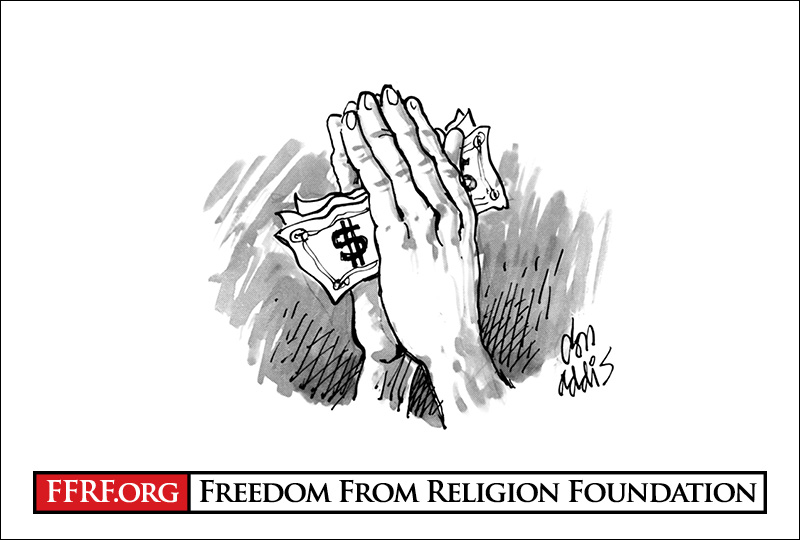
The Freedom From Religion Foundation (FFRF) is objecting on constitutional grounds to members of Congress urging federal agencies to include houses of worship in the stimulus package.
The CARES Act allows businesses and nonprofits to request forgivable loans from the federal government to cover operating costs and salaries. The Small Business Administration, in charge of the program, announced that it would allow churches and other houses of worship to receive funds, even though this violates its regulations. Several representatives wrote to Trump administration officials asking them to make certain that houses of worship were indeed being bailed out.
For members of Congress to blithely cast aside long-standing principles of separation of state and church — and to give support to the Small Business Administration’s move to remove these safeguards — is to sacrifice religious freedom in a moment of panic, FFRF asserts.
“Even in a pandemic, Americans must not be forced to fund churches,” FFRF Co-Presidents Dan Barker and Annie Laurie Gaylor write to the representatives who contacted the Trump administration. “When the government awards taxpayer dollars to pay for religious worship, a church’s bills, or a minister’s salary, it forces taxpayers to fund that church’s religious mission.”
One of this country’s first religious freedom laws warned that taxing citizens and giving the money to churches is “sinful and tyrannical.” The right to be free from that compulsion is the bedrock of religious liberty, FFRF emphasizes. The now-abandoned principle embodied in SBA’s original regulations limiting the religious use of taxpayer funds is that the government shouldn’t tax citizens to benefit a religion. James Madison explained this purpose well in his condemnation of even a three-penny tax to support Christian preachers and churches: “The religion then of every man must be left to the conviction and conscience of every man.”
Madison’s conclusion is based on history that seems distant today, but which was the result of centuries — millennia — of oppression from religion blended with government, FFRF offers as a reminder. Thanks to the separation of state and church, Americans do not have the oppressive experience of being forced to tithe to churches. But that these principles have succeeded so well is a reason to continue to abide by them, not set them aside.
The U.S. Supreme Court discussed this foundational principle at length when it first applied the Establishment Clause to the states. In Everson v. Bd. of Educ. of Ewing Township (1947), it said: “No tax in any amount large or small, can be levied to support any religious activities or institutions, whatever they may be called, or whatever form they may adopt to teach or practice religion.” The court later reiterated a strong commitment to the religious liberty principles articulated in Everson, including the prohibition on giving public aid to religion. Its lengthy discussions of the meaning and purposes of the First Amendment’s religion clauses in these cases focused on the separation of religion and government — to the benefit of both. The court never hinted that the religion clauses actually require taxpayers to fund religion.
Our nation, our Founders and our Supreme Court have always understood that religious liberty flourishes when the government does not tax citizens to aid religion, FFRF maintains. Consistent with this fundamental truth, federal agencies including the Small Business Administration had adopted regulations to protect the religious liberty of taxpayers by prohibiting religious funding. It is unhelpful and contrary to the U.S. Constitution and American history for members of Congress to write to agency heads telling them to disregard those regulations, FFRF concludes.
The Freedom From Religion Foundation is a national nonprofit organization with over 31,000 members across the country, including in every state. It works to protect the constitutional separation between state and church and educates about nontheism.
